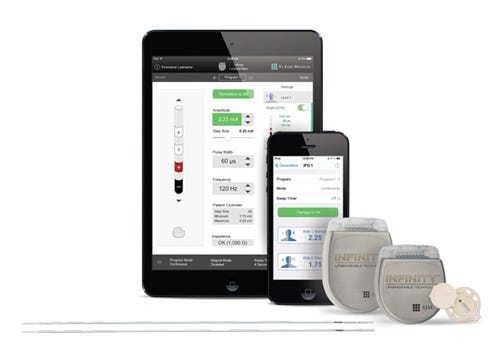October 7, 2016
The Infinity deep brain stimulation system boasts a directional lead and a software platform that connects to Apple devices.
Chris Newmarker
 St. Jude Medical recently announced FDA approval of its Infinity deep brain stimulation system, one of the latest neuromodulation devices meant to help treat the symptoms of Parkinson's disease or essential tremor.
St. Jude Medical recently announced FDA approval of its Infinity deep brain stimulation system, one of the latest neuromodulation devices meant to help treat the symptoms of Parkinson's disease or essential tremor.
The Infinity--approved more than a year after St. Jude's previous Brio neurostimulation system won FDA approval--marks St. Jude's latest salvo in its competition with Medtronic in the field. Cardio device companies have been increasingly taking pacemaker technology and using it to treat a host of ailments throughout the body, from brain disorders to eating problems to chronic pain.
The Infinity is the first FDA-approved DBS to have a directional lead providing targeted therapy to only the necessary areas of the brain that need it, according to St. Jude Medical.
"I believe that the directional lead represents an important advancement in DBS technology that has the potential to improve outcomes of DBS therapy for many patients," said Kelly Foote, MD, professor of neurosurgery and co-director of the University of Florida Center for Movement Disorders and Neurorestoration at the UF Health Shands Hospital.
"This new system offers the potential to diminish adverse effects of DBS by steering current away from areas of the brain that cause side effects, allowing us to better control the symptoms of Parkinson's disease and essential tremor," Foote said in a St. Jude news release.
St. Jude also boasts that the Infinity is the first and only DBS device in the U.S. able to connect with Apple devices. The wireless iOS software platform enables clinicians to program the device with an iPad mini, and for users to discreetly control the device using an iPod touch.
"The new St. Jude Medical Infinity system was designed to streamline therapy programming, allowing physicians more time to provide care to more patients. The system was also designed to provide patients with the best possible experience to manage their symptoms in a discreet manner that fits more easily into their lives," said Allen Burton, MD, medical director of neuromodulation and vice president of medical affairs at St. Jude Medical.
Chris Newmarker is senior editor of Qmed. Follow him on Twitter at @newmarker.
Like what you're reading? Subscribe to our daily e-newsletter.
[Image courtesy of St. Jude Medical]
About the Author(s)
You May Also Like


